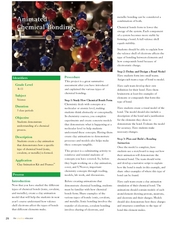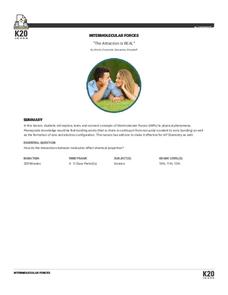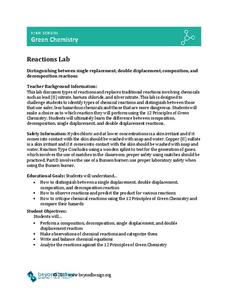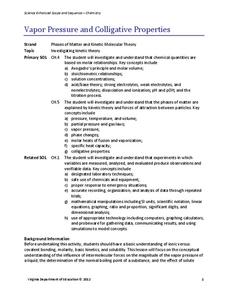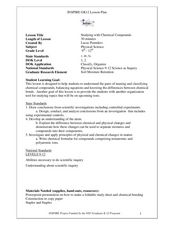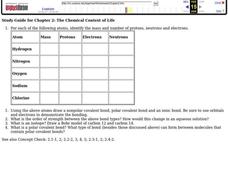Curated OER
Animated Chemical Bonding
Students demonstrate their understanding of a chemical process. In this exploratory lesson students create a clay animation that shows how a specific type of chemical bond.
Curated OER
Bonding Review
Students differentiate metallic, ionic and covalent bonding. In this chemistry lesson, students explain how these bonds are formed. They classify substances according their bond type.
Curated OER
A Very Simple Conductivity Meter
Students conduct a simple conductivity meter to test the ionic or non-ionic nature of water samples including one from their home.
Curated OER
Chemical Bonding
Eighth graders identify the three main types of chemical bonds. In this chemistry instructional activity, 8th graders draw Lewis dot diagrams of elements and determine the bond formed. They create a model water molecule.
K20 LEARN
The Attraction is REAL
How attractive is your intermolecular forces lesson plan? Draw your class in with an activity that includes research, presentation, and demonstrations. Chemistry scholars work together to create claims about the each intermolecular...
American Chemical Society
Development of Baking Powder
Did you know baking powder can be used to treat acne, whiten teeth, and make sugar cookies? The lesson plan on the development of baking powder is ready-to-go with no preparation required. Through readings, pupils answer questions,...
Beyond Benign
Reactions Lab
You're bound to get a reaction from your classes with this experiment! Scholars perform several chemical reactions, make observations, and classify the reactions as single replacement, double replacement, composition, or decomposition...
Curated OER
How is the Strength of an Acid Determined?
Young scholars study acids and how they can be measured. In this acid lesson students distinguish the properties that create strong and weak electrolytes.
American Chemical Society
Temperature Changes in Dissolving
Alia-Seltzer tablets cause a very obvious chemical change, but do they also cause a temperature change? Each class member explores hot/cold packs, discussing how these temperature changes occur. Groups then design and carry out their own...
Curated OER
The Nature of Salt
High schoolers record information from the periodic table for sodium and chloride. They determine whether salts are molecular or ionic compounds, along with sodium chloride's molecular weight, and relative weights
Virginia Department of Education
Vapor Pressure and Colligative Properties
Hate to vacuum, but enjoy using a vacuum pump? Explore a lesson plan that starts with a demonstration of boiling water at various temperatures by using a vacuum pump. Then scholars design their own experiments to measure vapor pressure...
Virginia Department of Education
Matter and Energy: Equations and Formulas
Using simple materials, an informative lesson demonstrates the Law of Conservation of Matter and explains how to balance chemical equations. Young chemists perform experiments, analyze reactions, and balance chemical equations on their...
Kenan Fellows
What Element Would You Be?
Primo Levi wrote a collection of short stories comparing his life from Italy to Auschwitz to elements in the periodic table. Pupils read an excerpt from his book and research the characteristics of various elements. Then, they make a...
Curated OER
Studying with Chemical Compounds
Students create a foldable to help them remember topics on chemical compounds. In this physical science lesson plan, students differentiate ionic and covalent compounds. Given certain compounds, they identify whether it's ionic or covalent.
Curated OER
Chemical Formulas
Students assess how to go from writing ionic chemical formulas to nomenclature and naming chemical compounds. They brainstorm former studies and share their thoughts in small groups. A list of everyday products (shampoos, toothpaste,...
Curated OER
Properties of Matter
Students investigate the properties of matter. In this properties of matter lesson, students observe containers of different metals and discuss their properties including density. Students find the density of an unknown metal and of...
Curated OER
Polymers
Students explore online tutorial on polymers. In this chemistry lesson, they create two polymers in the lab and compare their properties. They write a sales letter about their new and improved polymer product.
Curated OER
Differentiate Elements, Compounds, and Mixtures
Students examine the differences between elements, compounds and mixtures. Using diagrams, they compare and contrast atoms and molecules and describe various chemical reactions. They distinguish the differences between ionic and...
Curated OER
Chemical Reactions
In this reactions worksheet, students state the differences between a coefficient and subscript and an exothermic and endothermic reaction. Students review the different types of reactions. This worksheet has 13 short answer questions.
Curated OER
Solution Chemistry Investigation
Students engage in a lesson that is concerned with the concepts related to solution chemistry. They calculate the molar mass of various chemical compounds. Then students predict the anion ratio for ionic compounds. Students also write...
Curated OER
Liquids and Solids
Students describe the properties of solids and liquids, and explain how a semiconductor works. In this atom lesson students demonstrate the bonding properties of carbon and silicon.
Curated OER
Chemical Formulas Unit-Day 4
The purpose of this lesson plan involves reviewing nomenclature and molecular
formulas as well as introducing naming molecular compounds and identifying acids. The students investigate and understand how conservation of energy
and matter...
Curated OER
Can Chromatography Separate A Pigment?
High schoolers separate a mixture of pigments with ion exchange chromatography and predict whether the ion-exchange matrix is positively or negatively charged based on the type of pigment bonded to the matrix.
Curated OER
The Chemical Context of Life
In this chemistry worksheet, young scholars fill in the chart for question one. The chart is filled out examining the mass, protons, electrons, and neutrons for specific atoms.
Other popular searches
- Covalent and Ionic Bonding
- Chemical Bonding Ionic
- Ionic Bonding Lab
- Practicing the Ionic Bonding
- Labs Ionic Bonding
- Chemistry Ionic Bonding
- Ionic Bonding Nomenclature
- Convalent and Ionic Bonding
- Ionic Bonding Discussion
- Ionic Bonding Lesson Plans
- Ionic Bonding Lesson
- Covalent Ionic Bonding


